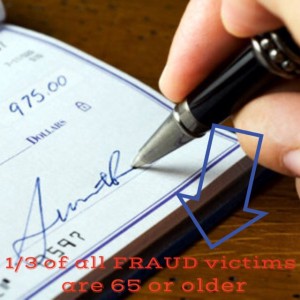Several news stories have come out recently that have brought attention to a problem that many seniors face, but too few of us know about. Elder financial abuse is a fast-growing form of abuse, and nearly 1/3 of all fraud victims are over the age of 65. As this  type of abuse has become more prevalent, awareness has slowly begun to grow. In November of 2013, the United States Senate Special Committee on Aging launched a fraud hotline. In the one year after its inception, the committee staff responded to over 1900 reports of fraud against seniors. However, that only includes the cases that were reported. An AARP study of senior fraud victims found that 75% of all victims age 55 years and older did not report fraud committed against them. The reasons for this are many, but can include shame over having been a victim, fear that they will lose some independence when relatives find out that they were taken advantage of, and due to memory issues and difficulty remembering details of the crime.
type of abuse has become more prevalent, awareness has slowly begun to grow. In November of 2013, the United States Senate Special Committee on Aging launched a fraud hotline. In the one year after its inception, the committee staff responded to over 1900 reports of fraud against seniors. However, that only includes the cases that were reported. An AARP study of senior fraud victims found that 75% of all victims age 55 years and older did not report fraud committed against them. The reasons for this are many, but can include shame over having been a victim, fear that they will lose some independence when relatives find out that they were taken advantage of, and due to memory issues and difficulty remembering details of the crime.
The elderly are often the targets of financial abuse, and for many reasons. This population of individuals generally has a “nest egg” and good or excellent credit. They are less likely to report the crime, for reasons outlined above. Additionally, many seniors live alone, making them easier targets. The final reason, and the one we hope to target most with this blog post, is a lack of information on the subject. We hope to use the rest of this blog to inform our readers about the most common types of financial fraud, how to recognize the signs of financial abuse, ways to protect yourself, and what to do if you or your loved one is a victim.
Types of Financial Fraud:
• Healthcare-related Scams: Medical alert device scams; counterfeit prescriptions; medical records being compromised; legitimate insurance information being used to submit falsified claims
• Medicare Fraud-Medical products (often unnecessary, inaccurately described, or not the most beneficial product for the individual) are forced onto seniors and then billed through Medicare; one of the most costly types of financial fraud
• Identity Theft-Predators use information they have garnered through unsecured internet sites to steal the identity of victims; also commonly committed by caregivers or relatives; perpetrator will use the new identity to make purchases, open lines of credit, and rack up large amounts of debt
• Phone Scams-International lottery scams where the individual is asked to pay fees or taxes upfront prior to receiving their winnings; charity solicitations; timeshares
• Internet Fraud: Victim falls in love with someone online and are convinced to send them large sums of money; women are the most common victims of romance scams
• Grandparents Scam: A con artist will gather information through social media and obituaries and then will impersonate a loved one of the victim; victim will receive a phone call (often in the middle of the night) from a “loved one” who is in need of quick money to get them out of jail or to help pay for a hospitalization
Warning Signs that Fraud is being committed or has been committed:
• Excessive number of magazine subscriptions
• Checks and withdrawals that the elder cannot explain
• Unsolicited calls from marketing companies offering too-good-to-be-true opportunities
• A recent acquaintance expresses interest in finances
• Caregiver or relative has no means of support and is overly interested in the elder’s financial efforts
• Checking account and credit card statements are sent to a relative or caregiver and are not accessible to the elder
• Unpaid bills, eviction notices or notices to discontinue utilities
• Belongings or property are missing
• Suspicious signatures on checks or other documents
• Implausible explanations about the elderly person’s finances by the elder or caregiver
• The elder is unaware of or is unable to communicate the reasoning behind recent financial decisions.
Ways to Prevent Fraud:
• Be informed-know the most common types of fraud; watch and read the news for scams that are occurring locally
• Beware of too-good-to-be-true offers; trust your instincts
• Shred sensitive documents, including bank statements and receipts
• Never give out personal information over the phone unless you initiated the call. This includes social security number, medicare number, and account numbers
• Never pay taxes or fees to collect on sweepstakes or lottery winnings
• Monitor account activity regularly, and report any suspicious activity immediately
• Report lost or stolen credit cards and checks
• Check references and credentials prior to hiring anyone
• Don’t allow workers to have access to information about your finances
• Never rush into a financial decision or let someone pressure you into any agreement
• Report instances of fraud
How to Report Fraud:
• Submit information about fraud through electronic tip line at //tips.fbi.gov
• Call the Fraud Hotline at 1-855-303-9470
• Call, email, or visit your local FBI field office:
FBI Detroit
477 Michigan Avenue
Detroit, MI 48826
detroit.fbi.gov
313-965-2323